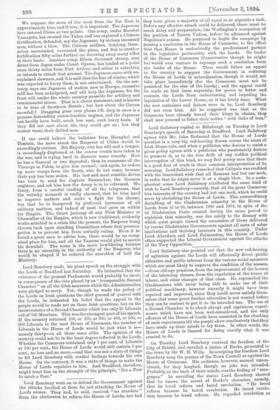If one could believe the bulletins from Shanghai and Tientsin,
the news about the Emperor of China would be exceedingly curious. His Majesty, who has will and a temper, is exceedingly displeased at the course events have taken in the war, and is trying hard to discover some remedy. Now he has a General or two degraded ; then he summons all the Viceroys to Pekin, to give him counsel ; and again, he orders up more troops from the South, who do not come, because their pay has been stolen. His last and most sensible device has been to send for Captain Hannecken, the German engineer, and ask him how the Army is to be reformed. We fancy, from a careful reading of all the telegrams, that the unlucky monarch is really alarmed, that he tries hard to improve matters and make a fight for his throne, but that he is hampered by profound ignorance of all military matters, and indeed of most that goes on within his Empire. The Court jealousy of any First Minister or Chancellor of the Empire, which is now traditional, evidently works mischief in a crisis like the present, the Emperor being thrown back upon standing Committees whose first preoccu- pation is to prevent him from actually ruling. Even if he found a great man to advise him, there would be no recog- nised place for him, and all the Yamens would plot to secure his downfall. The scene is the more bewildering because there is no unreality in the authority of the Emperor, who would be obeyed if he ordered the execution of half the Ministry.


















































 Previous page
Previous page